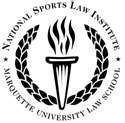Maybe it was a conspiracy among powerful figures in Washington that did in Herman Cain’s presidential campaign, his campaign manager suggested Thursday at Marquette University Law School.
Mark Block, the unconventional political operative who became a celebrity himself during Cain’s once-hot run for the Republican nomination, said he fully believed from the earliest days of the campaign that Cain was going to be the next president of the United States.
But after more than a month as a front runner last fall, Cain saw the wheels come off his bid with a series of news stories about alleged inappropriate sexual conduct by Cain and Cain’s bungling of some questions, especially one about Libya asked during a Milwaukee Journal Sentinel editorial board meeting.
When Mike Gousha, the Law School’s distinguished fellow in law and public policy, asked Block what happened, Block answered, “I think what happened, this is a little bit of the conspiracy theory in me, he (Cain) scared the hell out of a lot of people in Washington, D.C., and it was time to take him down, take him out.”
Asked by Gousha if he knew who might be involved, Block answered, “Don’t know that, but I can tell you when I find that out, it’ll be a best selling book.”
Asked after the one-hour “On the Issues” session if he could amplify on the subject and whether a conspiracy might have come from the right or the left, Block said he had no evidence and offered no answers.
If not for the events in October, Block said, he was convinced Cain would be well on his way to the Republican nomination now.
Block himself caused a sensation with a campaign ad posted on the Internet last fall in which, after saying how much he believed in Cain, Block took a deep puff on a cigarette and, as the smoke was exhaled, the image dissolved to a photo of Cain. Cain aides estimate the ad has been viewed more than 20 million times. Block said, “It cost us $4 to film that.”
Block provided an introductory video for the Eckstein Hall session which included a taped message from Cain thanking Marquette and Gousha for giving Block a chance to ”share our story.” The video focused mostly on the cigarette ad. The session, including the video, can be viewed by clicking here.
Block, a Wisconsin native, was a long-time and sometimes controversial political operative in Wisconsin. One of the people in audience Thursday was Walt Kelly, who lost a race for Wisconsin Supreme Court in 1997. Block managed the campaign of Kelly’s opponent, Jon Wilcox, and Block was subsequently banned from Wisconsin politics for three years as part of a settlement of charges that he colluded with an independent organization in violation of campaign laws. From the audience, Kelly asked Block whether he was still under investigation for possible collusion with other organizations during the Cain campaign. “Not to my knowledge, Walt,” Block answered.
Asked by Gousha about the interview at the Journal Sentinel in which Cain struggled to come up with an answer when asked what he thought of how President Obama handled Libya, Block said, “In retrospect, what I should have done is cancel that interview.” Cain was exhausted that morning and should have taken a break, Block said.
Block said it is likely the Republican presidential candidate won’t be picked until the national convention this summer. He said candidate Newt Gingrich will pick up a lot of delegates in the Super Tuesday primaries on March 6. Cain has endorsed Gingrich.
Block said Cain would not agree to be the vice presidential candidate and would not accept any Cabinet seat in a Republican administration except possibly secretary of defense. He said Cain remains “extremely upbeat” personally and is working hard to promote the defeat of President Barack Obama this year and to see the “9-9-9” tax plan become law. “He’s on a mission,” Block said.
Block continues to be a big part of that mission – he now has the title of chief of strategic planning and development for Cain’s Solutions Revolution, one of several organizations that Cain has created.
 The Marquette Sports Law Moot Court team advanced to the quarter-finals of the Mardi Gras Sports Law Invitational Competition hosted by Tulane University Law School. Please congratulate team members Timothy Bucher, Cassandra Jones, and Sabrina Stephenson. Professors Matt Mitten and Paul Anderson coached the team.
The Marquette Sports Law Moot Court team advanced to the quarter-finals of the Mardi Gras Sports Law Invitational Competition hosted by Tulane University Law School. Please congratulate team members Timothy Bucher, Cassandra Jones, and Sabrina Stephenson. Professors Matt Mitten and Paul Anderson coached the team.